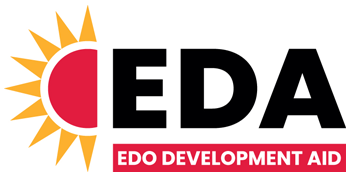Facts & Statistics
The people of Edo State have a rich and vibrant cultural heritage and they are deeply aligned with their traditional values, norms and beliefs. They are resilient, optimistic and forward-looking people at home and in the diaspora.
Despite their ancestral and natural endowments, the vast majority of the people of Edo State are experiencing hardship and poverty, with little or no income, possessions or access to the basic necessities of life.
There are significant inequalities in the communities where many are impoverished, and are on a daily basis experiencing the effects of crime, economic deprivations, insecurity and poor health with shortened life expectancies. Human violence, oppression by others, mal-administration by public and private agencies, environmental degradation and acts of God are having devastating effects on the lives of the people of Edo State.
Edo State
Edo State is one of the 36 states of the Federal Republic of Nigeria.
Although Nigeria is rich in petroleum and natural gas, it is one of the poorest and most unequal countries in the world, with over 6 out of ten of the population living in poverty.
The state is inhibited by the Edo (Bini) people, who are linked to the historic kingdom of Benin. Benin City is the state’s capital, and the main ethnic groups are Bini, Afemais, Esans, Owans and Akoko Edos. The state also has a large number of residents from across the country and the world.


Poverty
Today in Edo State, the average size of a household is between seven and ten, consequently the living conditions in rural areas of Edo State are very unhygienic.
Six in 10 people in Edo currently live on or under the poverty line.
According to the United Nations standard, poverty in Nigeria is prevalent because more than half of Nigerians live below the poverty line of one dollar per day. Most of these people reside in the rural areas where illiteracy prevalence is high, portable water and health facilities are rarely available, road and electricity infrastructures are either unavailable or ill-managed.
Fire outbreak has also contributed to destroying the means of livelihood for many people. In December 2019, traders of Ekiosa market in Benin City lost goods worth millions of Naira, as fire razed the popular market.
Flooding
Benin City is approximately 8.5km above sea level and lies in the thick equatorial rainforest zone, prone to heavy rainfall. Continuous rainfall periods ranging from 10 – 12 days are often experienced.
Rainfall affects most parts of Benin City. The effects are mostly felt in Oredo and Ikpoba Okha where improper waste disposal accentuates the impact of heavy rainfalls and worsens the flood situation. Flooding in Benin City is also influenced by the nature of the area, and its proximity to the Atlantic Ocean.
The major loss that is experienced from flood occurrence is the destruction of property and destruction of houses.
Benin City remains the commercial and industrial nerve area of Edo State, however rainfall remains the most suspected cause of flooding due to the sub-equatorial climatic location of Edo State and Benin City in particular.


Education
Edo State has a challenging education environment with a poor education system where the growth, development and prosperity of children is hindered.
Pupils sit on the floor to learn and schools are dilapidated and often vandalised.
Despite its large economy, the country’s population has overwhelmed the education system, meaning that 1 in 3 children do not attend school.
Employment
Currently the unemployment rate is close to 50%.
Agriculture is the predominant occupation for residents in Edo State; Yams, cassava, oil palm produce, rice and corn are the major subsistence crops.


Human Trafficking
The International Organisation for Migration stated that of the over 11,000 women trafficked into Italy in 2016, the majority were from Edo State and were forced into prostitution as victims of sex trafficking, suffering various forms of brutality and other risks associated with their trade.
Those who were unable to make it to Italy became stuck in Libya, and are at risk of exploitation, arbitrary detention and becoming caught in the crossfire of the ongoing conflict.
Hospitals
There are reports that only three hospitals out of 34 owned by the State Government are functioning as at April 2018. Theatres are not well-equipped, and there is a lack of power and water supply to the hospitals. There is also a short supply of hand gloves, face masks, drip stands, wheelchairs and stationery for recording patients’ complaints.


